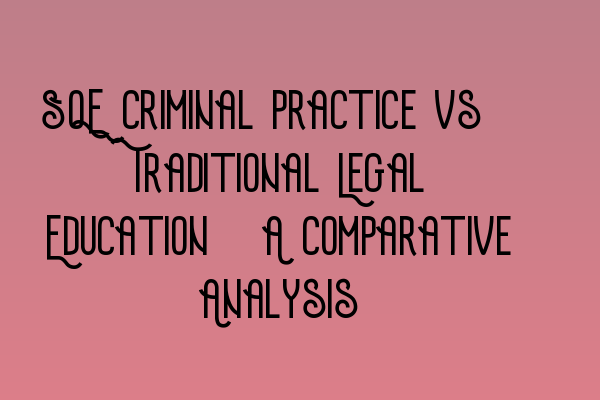SQE Criminal Practice vs. Traditional Legal Education: A Comparative Analysis
Legal education has always been an essential aspect of becoming a successful lawyer. With the recent introduction of the Solicitors Qualifying Examination (SQE), aspiring criminal law professionals now have a new pathway to enter the legal profession. In this blog post, we will conduct a comparative analysis of SQE Criminal Practice and traditional legal education to help you understand the key differences and advantages of each.
SQE Criminal Practice: The Future of Legal Education
The SQE Criminal Practice is a revolutionary approach to legal education that focuses on practical skills and knowledge. Unlike traditional legal education, which often heavily relies on theoretical concepts, the SQE Criminal Practice emphasizes hands-on experience and real-world scenarios.
The SQE Criminal Practice prepares future criminal law professionals for the challenges they will face in their careers. By engaging in simulated criminal cases, students develop the necessary skills to handle various legal situations, such as interviewing clients, drafting legal documents, and representing defendants in court.
One of the major advantages of the SQE Criminal Practice is its flexibility. Students have the opportunity to learn at their own pace and fit their studies around other commitments. This flexibility enables individuals from diverse backgrounds to pursue a legal career without sacrificing their existing responsibilities.
Traditional Legal Education: The Established Approach
Traditional legal education, typically offered by universities, follows a structured curriculum that combines theoretical knowledge with practical training. Students engage in lectures, seminars, and tutorials to gain a comprehensive understanding of the law.
While traditional legal education provides a solid foundation in legal theory and reasoning, some argue that it may not fully prepare aspiring criminal law professionals for the realities of the profession. The focus on academic learning can sometimes leave students feeling less confident when faced with practical challenges in their professional lives.
However, traditional legal education offers significant benefits, including the prestige associated with obtaining a degree from a reputable institution. Many employers still prefer candidates with a traditional legal education background, valuing the theoretical knowledge and research skills acquired through this route.
Comparative Analysis: SQE Criminal Practice vs. Traditional Legal Education
When comparing SQE Criminal Practice and traditional legal education, several factors come into play. The table below summarizes the key differences:
| SQE Criminal Practice | Traditional Legal Education | |
|---|---|---|
| Focus | Practical skills and knowledge | Legal theory and reasoning |
| Flexibility | Flexible learning at own pace | Structured curriculum |
| Hands-on Experience | Simulated criminal cases | Lectures, seminars, and tutorials |
| Prestige | Relatively new qualification | Reputation of the institution |
It is important to note that both pathways have their own merits. The decision between SQE Criminal Practice and traditional legal education should be based on individual preferences, career goals, and personal circumstances.
To further explore the impact of frustration on contractual obligations, check out our Legal Insights article. If you’re looking to enhance your knowledge of contract law, our Contract Law Tutorials are a great resource. Additionally, if you want to understand the hidden meanings behind contractual clauses, our article on Interpreting Contractual Clauses is a must-read.
For entrepreneurs, understanding the legal aspects of business contracts is crucial. Check out our article on Legal Aspects of Business Contracts to learn more. And if you’re interested in comparing SQE Contract Law with traditional qualifications, our article on SQE Contract Law vs. Traditional Qualifications provides valuable insights.
